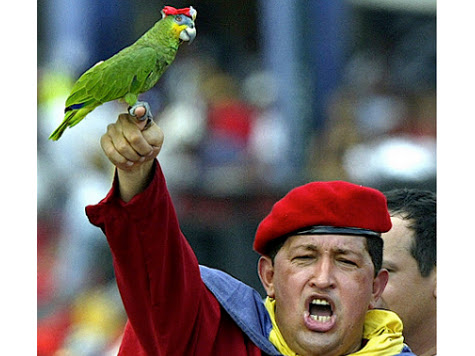
After a lifetime parroting Cuban caudillo Fidel Castro’s personal life and party line, the Bolivarian Republic of Venezuela’s ill Presidente, Hugo Chavez is dead. But under the lingering ministrations of the left’s octogenarian chief surgeon, Castro, what is the health of Hugo’s “21st-Century Socialism”?
At the outset of his rise to power, doubtless Hugo and every life insurance actuary worth their salt prognosticated the opposite outcome: emulating his secular god who art in Havana, the “fiery” young, self-described “subversive” would inherit the mantle of Latin (anti-)American leadership upon the death of his beloved Castro.
Yet, such are the perils of a derivative existence: in betting the “over” on the laws of nature, Hugo crapped out and wound up not Castro’s successor but Castro’s submissive; and Hugo’s earthly legacy proved a squalid caution to letting one’s Castro man-crush run amok.
That Hugo played “Joe C” to Castro’s Kid Rock is evident in their political careers’ undeniable and deliberate parallels.
-
Castro first rose to prominence “leading” a military coup against Cuba’s Moncada barracks; Hugo first rose to prominence leading a military coup against Venezuela’s Presidential palace.
-
During his trial, Castro delivered his defining personal manifesto, “History Will Absolve Me”; during his, Hugo delivered his defining personal manifesto, “For now.”
-
Shortly after being imprisoned, Castro was granted an amnesty; shortly after being imprisoned, Hugo was granted amnesty.
-
Shortly after being amnestied, Castro took power; shortly after being amnestied, Hugo took power. (Why is it that allegedly brutal right-wing regimes treated these left-wing coup leaders like Ernst Blofeld treated James Bond and with similarly dismal results?)
-
Shortly after attaining power, Castro unmasked and unleashed his anti-American, 20th-Century Socialist regime; shortly after attaining power, Hugo unmasked his anti-American, 21st-Century Socialist regime.
-
To bolster his regime’s appeal, Castro suppressed democracy, oppressed political opponents, expropriated the mantle of the iconic Jose Marti, and wore sporty military fatigues while holding a panatela; to bolster his regime’s appeal, Chavez suppressed democracy, oppressed political opponents, expropriated the mantle of the iconic Simon Bolivar, and wore sporty military fatigues while holding a parrot.
-
Castro bedeviled American Presidents by fomenting revolution throughout Latin America and allying with Russia, China, Iran, North Korea, and other rogue regimes; Hugo bedeviled American Presidents by fomenting revolution throughout Latin America and allying with Russia, China, Iran, North Korea, and other rogue regimes.
-
Castro practiced “trickle-down socialism”: expropriating private property to enrich his regime’s minions and “redistribute” wealth at the ultimate expense of the Cuban people and their economy; Hugo practiced “trickle-down socialism”: expropriating private property to enrich his regime’s minions and “redistribute” wealth at the ultimate expense of the Venezuelan people and their economy.
There are however, two critical distinctions. First, unlike Castro, Hugo had oil.
The pupil’s blessing was not lost upon the master, who in short order beguiled his eager acolyte Hugo into turning Venezuela into an anti-American ATM. This should have been the first red flag for Hugo that Castro had no intention of bequeathing him anything, for a rich relative doesn’t hit up an expectant heir for money.
Thus – no matter how much money oil money Hugo siphoned away from the Venezuelan people to support freedom’s antagonists and enemies; no matter how much gun and drug running Hugo facilitated for, amongst many, Colombia’s narco-revolutionaries to undermine that beset, American-aligned democracy; no matter how many rogue regime emissaries Hugo welcomed, feted, and abetted – never would Castro consider “21st-Century Socialism” as anything but an extension of “20th Century Socialism”; or Hugo as anything but his pawn.
Indeed, swiftly in the wake of losing his adoring disciple, a clear-eyed Castro shrugged and orchestrated a silent coup that violated the Venezuelan constitution’s Article 233 and ensured the permanent installment of Vice President Nicolas Maduro as “El Comandante,” Hugo’s successor; and kept the Venezuelan oil revenue pipeline open to Cuba and other anti-American zealots. Apparently, McCartney-Lennonism is correct: money can’t buy you love.
Thus, the second distinction: unlike Castro, Kid Rock loved Joe C.
Toward the end, did Hugo intimate his love for Castro was just a singular admiration society? There is this 2011 statement: “This is the path: the hard, long path, filled with doubts, filled with errors, filled with bitterness, but this is the path. The path is this: socialism.” (Note Hugo didn’t describe the destination or use the word “success.”)
While charity tempts some to give Hugo the benefit of the doubt and decipher his statement as a subtle indictment of Castro’s failed “20th-Century Socialism”, love him or hate him, Hugo was not a subtle man; consequently, his statement is but another doleful personal apologia from a deathbed socialist.
Instead, let’s be charitable to the newly departed by interpreting his statement as meaning that, despite its resurgence in Latin America and elsewhere, the dying Hugo knew “20th/21st-Century Socialism” was alive and well –
“For now”…
Guitarist Hon. Thaddeus G. McCotter is a recovering Congressbum and of Counsel at the Detroit law firm of Ottenwess, Allman &Taweel, PLC.

COMMENTS
Please let us know if you're having issues with commenting.